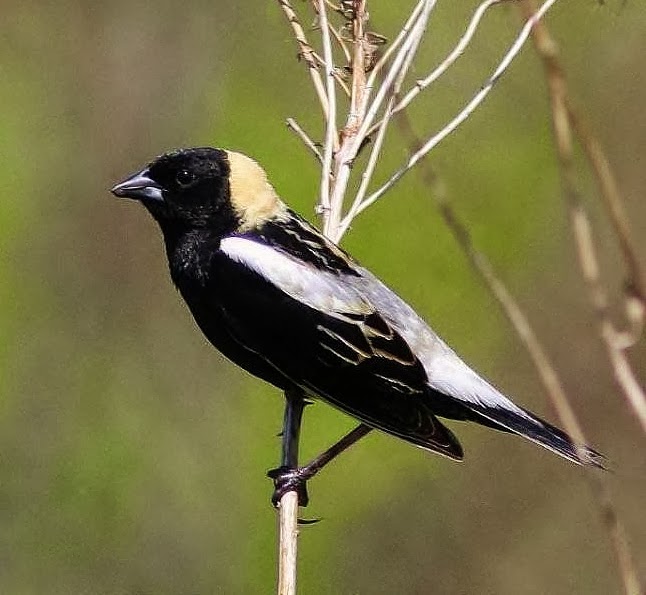 |
| Photo by Guy Poisson (Internet Bird Collection) |
Common name:
bobolink (en); triste-pia (pt); goglu des prés (fr); charlatán (es); reisstärling (de)
Taxonomy:
Order Passeriformes
Family Icteridae
Range:
This species breeds in southern Canada and the northern United States as far south as Oregon, Colorado, Illinois and Virginia. They migrate south to winter in eastern Bolivia, Paraguay and marginally into south-western Brazil and northern Argentina.
Size:
These birds are 15-21 cm long and have a wingspan of 27 cm. They weigh 30-55 g.
Habitat:
The bobolink breeds mostly in tall grasslands, also using arable land. Outside the breeding season they temperate and tropical dry grasslands, moist savannas and arable land.
Diet:
They feed on various wild seed, as well as larval and adult insects, and spiders. At the wintering grounds and during migration they also feed on domestic crops such as rice, oats and other small grains.
Breeding:
Bobolinks breed in May-August. They are polygynous, with male forming pairs with up to 4 females, but usually only helping raise the brood produced by the first female with which he mates. The nest is a cup made of dead grass and lined with fine grasses or sedges, placed on the ground among dense vegetation. The female lays 3-7 bluish-grey or pale reddish-brown eggs with dark spots and blotches. The eggs are incubated for 11-14 days and the chicks fledge 10-14 days after hatching.
Conservation:
IUCN status – LC (Least Concern)
This species has a large breeding range and the global population is estimated at 11 million individuals. The population is declining over most of its range, mainly due to agricultural intensification, but they are also shot as an agricultural pest on the wintering areas. The bobolink is not considered threatened at present.







